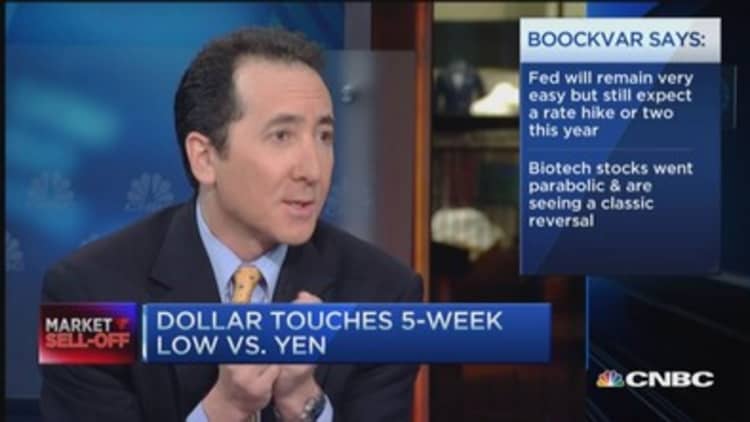
Wednesday's market selloff is a sign that the bubble created by the Federal Reserve's easy money policies is deflating, analyst Peter Boockvar said Thursday.
Noting the Fed's bond-buying policy ended in late October, Boockvar said the New York composite stock exchange is now back to where it was last July and the S&P 500 is heading back to November levels.
"QE, for example, enlarges the bubble, and once the air stops going into the bubble, the bubble starts to deflate again," the chief market analyst at the Lindsey Group said on CNBC's "Squawk Box."
Read MoreBiotechs could be the early warning for stocks
U.S. markets plunged on Wednesday, led by more than 2 percent declines in the and Russell 2000. The Dow tanked nearly 300 points, or 1.6 percent, while the S&P 500 finished the day about 1.5 percent lower.
The biotech and semiconductor sectors, both down 4 percent, weighed on the Nasdaq.
Boockvar called the move in biotechnology stocks a "classic parabolic reversal," a technical indicator that shows a change in an asset's momentum.
The Fed has missed its window to raise interest rates because it lacks the resolve to hike rates with average economic growth remaining below 2.5 percent, he said. The federal funds rate, the interest banks are charged for short-term lending to other institutions, remains near zero.
The central bank now lacks tools to tackle a further economic slowdown because it cannot drive down rates any further, he said.
Read MoreTraders say to buy the Nasdaq—'so bad, it's good'
"There is no easy way out of this, and if it means a recession, it means a recession. And if it means a pullback, it means a pullback. But I know looking out over the next five to 10 years, we've got to get out of this," Boockvar said.
He added that the cost of money itself is not an impediment to growth, and low rates have led to a "rotten economy" in which "zombie companies" can stay alive by borrowing in a cheap debt market.
That easy monetary policy does not create growth; it only pulls forward economic activity that would have happened on its own anyway, Boockvar said.
"We can get out of this if the Fed had any guts, but they don't," he said.
Normal interest rates create a more normal economic environment, he added. A federal funds rate near 1.5 percent, roughly the rate of core inflation, would still be extremely accommodative, he said.


